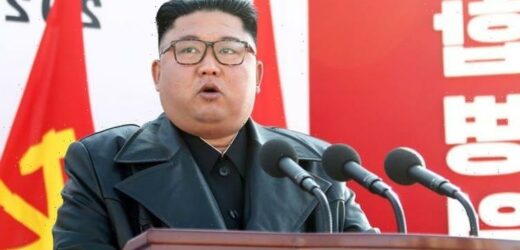Kim Jong-un wears leather jacket at ceremony in 2019
We use your sign-up to provide content in ways you’ve consented to and to improve our understanding of you. This may include adverts from us and 3rd parties based on our understanding. You can unsubscribe at any time. More info
A decade ago this week, Kim Jong-il died of a heart attack at the age of 69. A teary-eyed announcer, in a statement televised across the country, struggled to hide her sadness as she said he had died of physical and mental over-work. Pictures emerged of people weeping openly in Pyongyang, often in large groups, slumped on the floor.
His son, Kim Jong-un, was announced as the “great successor”, whom North Koreans should unite behind.
The next 10 years would prove to be a rollercoaster ride for both North Korea and the world.
Speaking to Express.co.uk, Professor Hazel Smith of the School of Orientalist and African Studies University of London described the start of his rule as one of “increased economic liberalisation and some degree of political liberalisation.”
She said: “Politically and economically, there have been two quite distinct periods in the last ten years.


“Until about 2016, you saw an economic semi liberalisation where markets grew in North Korea.
“Although there was no political liberalisation, individuals had more personal liberties because they participated in the markets and they didn’t depend on the government so much.
“There a period where there was an expansion of personal liberties and some stabilisation in the economy, but it was still an authoritarian government.”
All that changed when the United Nations slapped harsh sanctions on the military as well as the civil economy.
Dr Smith said: “In particular they banned all of North Korea’s exports, which were small anyway, and severely banned a lot of their imports like vehicles, machinery, and especially oil.

“North Korea requires oil for agriculture, so when that happens in 2018, the harvest collapses and food production drops catastrophically.”
Since then, the country has been in a state of starvation, and according to Dr Smith, Kim is waging a war on young North Koreans and forcing them to work too long hours to make up for it.
She said: “Rather than trying to negotiate with outsiders to try to improve the life of North Koreans, the government is trying to politically repress young people, and force them into trying to do extra work to make up for the imports which it no longer has.
“The degree of political liberalisation that had happened has closed down since 2018, particularly for young people.


“It’s not too much to say that there’s a war on young people today that’s trying to instal a system which we last saw in the 60s and 70s, which had absolutely no civil liberties and no access to foreign media.
“What’s happening is that young people are being punished for continuing to listen to and access South Korean media which some of them are still able to get ahold of.
“They’re being sent to work for long hours to compensate for all the imports that NK can no longer buy since 2016.
“My fear is that when any foreign media does actually get in, we may see starvation on a large scale has occurred.”
Source: Read Full Article


